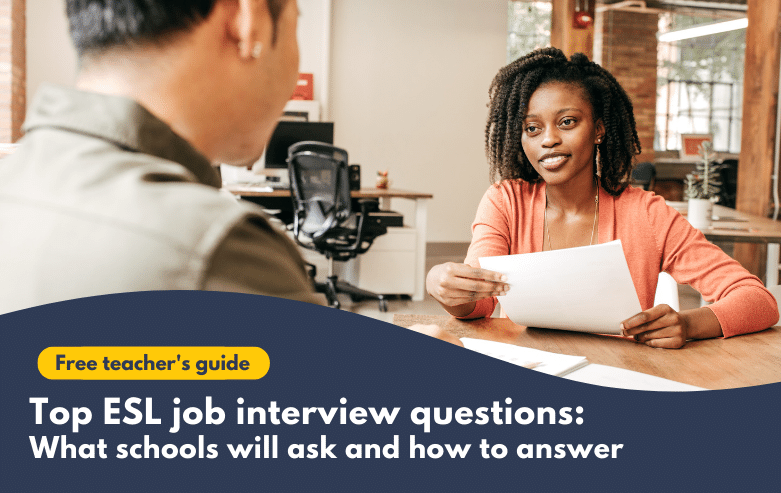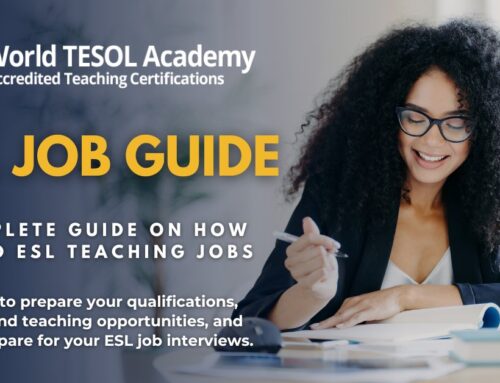
Top ESL Job Interview Questions: Part 1 of 2
If you are just starting out with your English teaching career, it can be tricky to know how to professionally answer questions that may come up during your ESL job interviews. With the help of proper research and preparation, you’ll be able to skillfully navigate your interviews and increase your chances of landing a great teaching job.
Knowing how to tailor your answers to each ESL job interview question is essential if you wish to form a strong connection with your interviewer. Each school will have certain requirements in mind and being able to adapt your answers could help you to stand out as the best candidate for the job. By spending time researching your potential employer and practicing how to adapt answers for different purposes, you’ll be able to walk into the interview with more confidence.
By now, it’s very likely that you’ve been through our ESL job interview guide. If you have then you should now be able to research potential recruiters and determine what qualities they might be looking for.
If you haven’t yet read our job interview guide, we’d suggest that you do so first. It’s important to be able to professionally research the position you are applying for, as this information will form the foundation that you’ll craft your interview answers around.
Once you’re done with your research, it’ll be time to prepare answers for some of the most common questions asked by schools and recruiters.
We’ll split these questions up into different themes and explore them in more detail below.

1. Introducing yourself to the recruiter
💬 Q: “Tell me a little bit about yourself”
The tried-and-tested elevator pitch. This is perhaps the most common opening question that you’ll receive during any interview regardless of the industry. This is an opportunity to provide the employer with a concise and thought-through introduction of who you are.
Focus on highlighting things about yourself that would translate well into teaching English, and generally avoid things that are unrelated to the position. It can be a good idea to go over the job ad a few extra times to see what qualities they look for in their teachers. This will allow you to prepare an answer that falls in line with what they are looking for.
Another important note is that you should try to mention things that go beyond your resume. Try to include something that is not written in the resume, as this can help you sound more natural when answering the question.
This question is also often used as a way to check your level of confidence and your presentation skills. As a teacher, you will be leading a class of students – this requires confidence and good leadership qualities. A well-crafted answer can display that you have good preparation skills, which is an important quality for teachers.
Background information to include:
🏫 Educational background – If you have a bachelor’s degree or higher, it is definitely worth mentioning this here. Even though the degree may not be teaching-related, it’s not uncommon for employers to appreciate that you have received a degree in general. If you have a teaching-related educational background, you should definitely mention this here. If you don’t have a degree then don’t worry – you could still mention other education achievements that you have.
💼 Occupational background – If you have worked as a teacher before, then you should certainly mention this. If you are just starting out, you should instead focus on showing your drive and excitement about starting your teaching career. What you lack in experience can often be mitigated somewhat with drive and a passion to learn and grow. You could also look at any previous work experience with transferrable qualities that might help with teaching.
💁 Personality traits – Focus on highlighting qualities that the employer is looking for in their teachers. Just make sure that it comes off as genuine. E.g. If you mention that you are enthusiastic, be enthusiastic. If you mention that you like to work with people, be social and charismatic. If you mention that you are driven, show this throughout the interview by providing examples of how you are always seeking new ways to challenge yourself.
🎭 Interests – Highlight interests that tie into the traits that the employer is looking for. E.g. hobbies that let you work with people = love connecting with people, youth coach = love working with children, etc. This is also a good opportunity to show the recruiter a more personal side of you which can help with building rapport and for them to see if you are a good fit for the teacher team.
Remember to keep it concise and practice well beforehand so that it sounds natural. The recruiter will most likely ask more in-depth questions later on during the interview, which will give you an opportunity to elaborate more on the things mentioned during the opening question.
Below we’ll look at some example introductions to illustrate the points discussed above.
Example introductions:
Example 1: “My name is Olivia, I’m Canadian-born and raised. After graduating from university where I majored in X, I started working as X. After working for a few years, I felt that I wanted to focus more on working with helping people, so I decided to get TESOL certified and try my hand at teaching. I’ve since taught English for X years in X different locations around the world. As a person, I’m curious and driven, and I feel the best when I’m able to help people. I think this is what drove me towards a career in teaching. When I’m not working, I like to X as this allows me to X.”
Example 2: “I’m Joshua, and i’m from the Philippines. I’m a recent university graduate that majored in Linguistics. I’ve always had a passion for languages and working with people. I feel this is what drove me towards pursuing a language-related degree and then getting TESOL certified. In my spare time, I like to X. This has been a good way for me to work closely with people and get some teaching experience. I am very much looking forward to launching my English teaching career, and hopefully it will be with your institution.”
Example 3: “My name is Madina, and i’m from Uzbekistan. My background is in marketing, but I recently decided to change direction and pursue a career in teaching. Growing up I’ve always had a love for languages, especially English. I believe this is why I felt a drive to re-school and pursue a TESOL certification. In my spare time, I play music in a band, which I also occasionally play live with. Performing in front of people is when I feel the best, which is why I think a teaching career is a good direction for me. Being able to help people through music and languages is something I believe strongly in. I’m very excited to launch a career in teaching, and hopefully I’m able to do it with your organization.”

2. Background questions
💬 Q: “How long have you been teaching English?” / “Tell me about your ESL work experience”
This is a basic question meant to gauge your previous teaching experience and how fast you are likely to start teaching comfortably. For this type of question, you should focus on your previous teaching experience that is relevant to the position you are applying for. This way you will be able to showcase that you will have an easier time stepping into the teaching role thanks to your previous experience.
Remember to:
- Keep your examples positive.
- Focus on the parts that are able to showcase your passion for teaching.
- Include things that you learned while teaching.
- Show how you can provide the employer’s students with a positive learning experience.
As a teacher, you are going to be a representative of their brand, so it’s important to make sure that you are able to teach according to their standards.
💡 Beginner tip: If you have limited in-class teaching experience, try to instead highlight other times you’ve been teaching English. Not all English teaching experience has to come from an ESL classroom.
It can be things such as teaching English at a summer camp, volunteer teaching, or private tutoring.
If you completely lack English teaching experience, try to find ways to start teaching on the side, even if it’s for free. This way you’ll be able to build up a little bit of experience that you can later on use when applying for paid teaching jobs.
Try asking around if there are family or friends that would like to receive some free teaching lessons. You can also advertise online on message boards and market places that you offer free lessons.
This is an easy way of quickly gaining some experience if you are completely new to teaching.
💬 Q: “Why did you quit your previous teaching job?
If you are moving to a new country to teach, then this question is quite easy to answer. You can mention that you’ve always wanted to live in the said country and explore the local culture and language. Showing interest in the local region is always a great choice as it will highlight that you are likely to stick around for a while.
If you are simply switching jobs in the same region, then you need to use a bit more tact when answering this question. Remember to keep everything you mention about previous work experiences positive. The truth is that not all teaching jobs turn out great, but that doesn’t mean that you should bad-mouth them.
The ESL teaching industry can be small, and word gets around easily. Whatever the reason is for your previous bad experiences, try to instead focus on the positives.
Example: You can mention that after having been working at your previous job for a while, you felt it was time to try something new as a way to further your personal development and teaching career. You can also mention that you’ve heard good things about the company that you are applying for and that their position better matches what you are looking for. This can help show that you have a genuine interest in the position and their organisation.
💬 Q: “Why did you want to become an English teacher?”
This question is often asked as a way to see how serious you are about teaching in general. Did you start teaching English because it was the only job you could easily find or did you start teaching English because you have a genuine passion for helping people realise their goals?
The truth is that not everyone woke up one day and realised that they wanted to start teaching English. Some people are guided towards it for different reasons. Be it money, a chance to travel or a love for working with children. There are many reasons why people set out on a teaching career. Whatever your own reason may be, make sure that you prepare an answer that sounds genuine but also highlights that you are committed and serious about your teaching career.
The last thing an employer wants is to hire a teacher that 1 month into their contract decides that teaching is not for them and quits. Make sure to let them know this is not you.
💬Q: “What makes you qualified to become an English teacher?”
It’s time to get down to the hard facts. This is where you will be able to show off your English teaching qualifications.
Things to include here are qualifications such as:
- Degrees
- Teaching licences
- English proficiency certificates like IELTS or TOEFL
- Engling teaching certificates like your 120-hour TESOL/TEFL certificate.
- Received awards or scholarships related to English teaching.
Anything that can help prove your credibility as a professional English teacher can be included.
Just make sure that whatever you include actually is useful for English teaching. Stating that you are a certified electrician may be impressive, but it hardly relates to English teaching. Remember to keep things relevant.
If your only qualification is an accredited 120-hour TESOL/TEFL certificate, don’t worry, you are already off to a great start. While not everyone is able to pursue a university degree, at least play with the idea of pursuing an English proficiency certificate like IELTS or TOEFL.
These can be great additions to your teaching certificates, as they will be able to prove that you possess a high level of English in addition to having the necessary teaching skills needed to professionally teach English.

3. General questions
💬 Q: “Why are you interested in this teaching position?”
Let’s face it, most people that are seeking jobs do it because they need an income. However, despite this being a general fact, it really isn’t something that you should mention to a potential employer, as you may come off as having no genuine interest in their position or organization.
What you should mention instead is what additional value you see in the teaching position. The organization and the teaching position may have some unique selling points or core values that can be worth including in your answer.
This can be things such as:
- Flexible teaching schedule.
- Nice and modern facilities,
- Internal career opportunities
Take an extra look at the job description and see if there’s anything specific that you find extra interesting, and then prepare an answer that highlights this.
💬 Q: “Why do you think you would be a good choice for our organization?”
This is where you get to show off that you’ve done your research about the company. Use this as an opportunity to highlight why you are the teacher that they are looking for! Go over the job ad a few times and list down the traits and qualifications that they are looking for.
You can then start crafting an answer where you highlight how your personal traits and qualifications match well with what they are seeking.
Things to consider here can be:
- Previous teaching experience
- Company core values
- Your personality traits
- If you’ve specifically taught in a similar setting,
- If you’ve taught similar types of students
💬 Q: “What made you decide to come to this country?”
This question should be quite easy to answer. Whatever the reason is for you being in the country, it can be a good to idea mention things that might play into your favour.
This can be things such as:
- Having an interest in the local culture and language.
- Previous visits to the country.
- Recommendations by friends.
Whichever reason you choose to mention, just make sure that it displays your genuine interest in the place and your likelihood of sticking around for a long time. This will make it more likely for the recruiter to see value in hiring you.
💬 Q: “What are your future plans?” / “How long do you intend to stay?”
The teacher turnover rate in the ESL industry is high, especially if you are teaching abroad. It’s very common that teachers that go abroad stick around for about 1 year, which is the usual length of a teaching contract.
After this, it’s not uncommon that they either try to bump up their pay by changing companies or that they end up changing locations to chase new experiences. This means that many employers need to hire new teachers every year, which in turn creates a desire for them to check how long you plan on staying.
When answering this it’s good to take an honest approach. Employers may want to see proof that you are planning on sticking around for a while. At a minimum, you should convince them that you will stick around long enough to complete the contract.
In the next part, we’ll continue to take a look at how to prepare professional answers for teaching-related questions, personality questions, and also the dreaded tough questions.




Leave A Comment